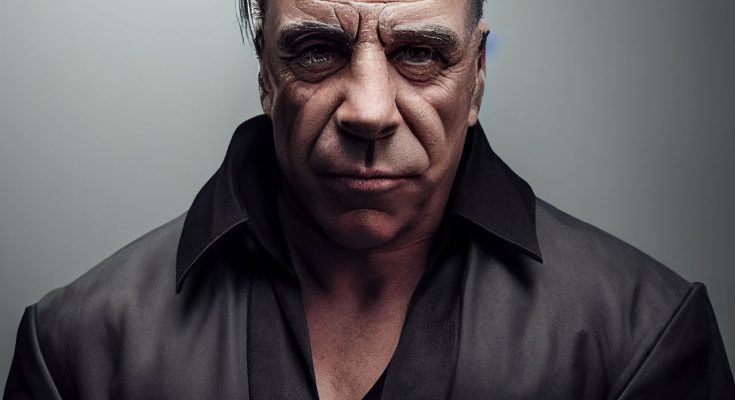You might think you know the frontman of Rammstein, but the real story of Till Lindemann is far richer, darker, more poetic, and more chaotic than most headlines let on. From East‑German athlete to global metal icon, his journey is one of transformation, contradiction and creation.
Born on January 4, 1963 in Leipzig (then East Germany), Lindemann grew up not amid rock star glitz but in a rigid society where sport and discipline were prized As a teenager he became a competitive swimmer—so good, in fact, that he was shortlisted for the GDR’s Olympic team in 1980.That early immersion in training and control would later contrast sharply with his stage persona: wild, explosive, unrestrained.
His family background reveals the seeds of his poetic and visceral style. His father, Werner Lindemann, was a poet and children’s‑book author; his mother, Gitta Lindemann, a journalistSo, while you see fire, theatrics and metal, underlying it all is someone born to write, to reflect, to push boundaries with words as much as he does with flame.
In the mid‑1980s Till shifted from sport to music, joining the underground punk band First Arsch (a name that gives you a hint of the attitude). This marked his departure from the structured world of swimming into something less predictable, less constrained. By 1994 Rammstein formed, and Lindemann emerged as their frontman—his deep baritone voice, his rolling “r” sound when he sings, the raw German lyrics, became instantly distinctive.
Rammstein’s music is intense, provocative and unapologetic. Their first album, Herzeleid (1995), shocked some critics in Germany—accused of being “redneck rock” or flirting with nationalistic imagery—but that misunderstanding only served to raise their profile. Lindemann once admitted that if people get upset by what he writes, it pushes him to write more. What exactly does he write about? Pleasure, pain, transgression, desire, the ugly side of existence. He blends brutality with beauty, shock with poetry, making you look when you might prefer to aver your eyes.
His live performances are as much theatre as rock concert. Flames burst. He sets himself ablaze (literally or metaphorically). He is a certified pyrotechnician—for real. After a stage incident in Berlin in 1996 (a burning prop dropped on the crowd), Rammstein revamped their safety and spectacle game; Lindemann trained alongside pyro crews to make sure the chaos on stage is precise. The result: shows that look like controlled disasters—beautiful, terrifying, unforgettable.
Despite the spectacle, Lindemann retains an introspective side. He has published collections of poetry: Messer, In stillen Nächten, 100 Gedichte. He knows that beneath the leather and flames lives a writer, and that the darkness he evokes is not empty but full of meaning. He sees a connection between raw emotion and crafted art.
In recent years he has branched beyond Rammstein. In 2015 he launched the side‐project Lindemann with Swedish metal musician Peter Tägtgren—an outlet to explore English lyrics, different tones, different provocations. And as the world changed, so did he: Rammstein took hiatuses; Lindemann kept moving.
Yet with fame and spectacle come controversies. In 2023, Lindemann found himself the subject of serious accusations of sexual misconduct and drug‑related complaints. Berlin prosecutors examined the case but ultimately dropped the investigation for lack of evidence. Even so, the shadow of those allegations hangs in conversations about his persona and the culture that surrounds him.
What drives Lindemann? It seems to be a quest—both for spectacle and for meaning. He once described Rammstein as “a big corset that asphyxiates you.” On one hand, he is trapped in his role—the frontman, the pyrotechnician, the voice of industrial metal—but on the other, he uses that very role to break free, to dismantle the corset from the inside. His lyrics dig into taboo, his shows break expectations, his persona lives between art and danger.
For someone in Nigeria reading this, it’s worth noting how universal his art is. He started in a specific place—East Germany, a country of walls and surveillance—and yet his music speaks internationally to fear, desire, rebellion. In a place like Uyo, for example, where local musical heritage may differ, Lindemann’s work shows how identity, state‑control, poetic rebellion, and mass spectacle can intersect. It’s not just German metal; it’s human theatre.
His voice is unmistakable: deep, gravelled, urgent. His presence on stage is dominating. And yet there’s a tenderness in his creative gestures: the poem, the book, the quieter project. The contrast between the monstrous stage persona and the poet behind it is part of what makes the “untold” story compelling.
Lindemann also reminds us that art often comes from tension: the tension between order and chaos, between the athlete who followed rules and the performer who breaks them, between the man of letters and the figure engulfed in flame. He doesn’t just sing “Du hast” (that early Rammstein hit) and set fire to things—he writes about what it means to have fire inside, to be seen, to shock, and yet also to reflect.
There’s a lesson here for any artist or creator: embrace your contradictions. Use your background—whether it’s sport, poetry, survival—to fuel something unexpected. Lindemann didn’t throw out his early life; he twisted it into a stage persona that would stand out. He didn’t abandon lyricism for metal; he merged them. He didn’t shrink from the spectacle; he mastered it.
In sum, the story of Till Lindemann is one of transformation: from East German swimming lanes to the burning stage, from punk drummer to frontman to poet of darkness and fire. He thrives in the space where chaos meets precision, where shock meets lyric, where the spectacle opens up meaning. If you’ve only seen the flames and heard the roar, you’ve missed half the story. Because behind the metal mask, the books of poetry, the blazing stage, there is a man bending the rules of what heavy music—and heavy art—can express.
And if you’ll allow one final thought: next time you see him perform—or listen to his lyrics—ask what is being burned, what is being revealed, what is being questioned. That’s where the untold story lives.



